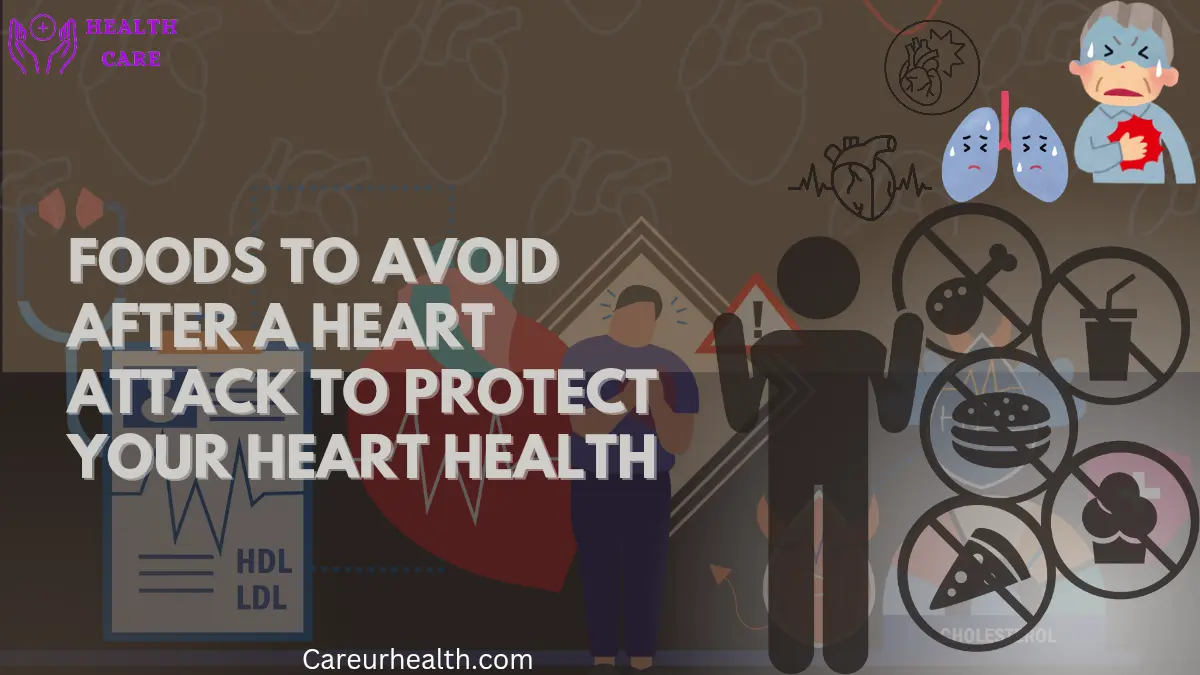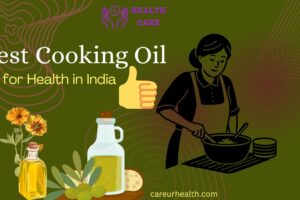Introduction
A clear list of foods to avoid after a heart attack can help prevent further complications and protect your heart health.
After experiencing a heart attack, making mindful dietary choices is crucial to prevent further complications and support heart health. Certain foods can significantly impact heart health, potentially increasing the risk of another cardiac event.
Key Takeaway: Five Essential Points
- Avoid processed and packaged foods due to high levels of unhealthy fats, sugars, and preservatives.
- Limit fried foods, which are high in saturated and trans fats.
- Minimize sugary beverages to maintain stable blood sugar levels.
- Choose lean meats and plant-based proteins over red and processed meats.
- Reduce high-sodium food consumption to manage blood pressure effectively.
The heart attack patient diet chart provides a clear guideline on what foods to include and avoid for recovery.
“ By understanding which foods to avoid, individuals can take proactive steps toward improving their recovery and long-term well-being. Following the list of foods to avoid after a heart attack can significantly reduce the risk of heart disease.”
Processed Foods
The cardiac diet chart includes a variety of foods that support heart health, such as fruits, vegetables, and whole grains.
Processed and packaged foods often contain high amounts of unhealthy fats, sugars, and sodium. These types of foods can raise blood pressure, increase inflammation, and contribute to weight gain, all of which put additional strain on the heart.
Many processed snacks, canned soups, and frozen meals also tend to have hidden trans fats and preservatives, making them a poor choice after a heart attack. It’s important to know the list of foods to avoid after a heart attack to manage your diet effectively.
After a heart attack, maintaining a heart-healthy diet is crucial for preventing further complications and supporting recovery.
Certain foods can increase the risk of another heart attack by raising cholesterol levels, blood pressure, and inflammation. It is important to be mindful of what you eat and focus on making healthier choices.
Reducing the consumption of certain foods helps to lower strain on the cardiovascular system and promotes long-term heart health. Many heart attack survivors refer to the list of foods to avoid after a heart attack to guide their dietary choices.
PackagedFoods
Processed foods, such as ready-to-eat meals, canned soups, and pre-packaged snacks, are often high in sodium, unhealthy fats, and sugars.
These ingredients can lead to fluid retention, elevated blood pressure, and weight gain, which can all negatively impact heart health. Regular consumption of processed foods may also contribute to inflammation, a key factor in heart disease.
For heart attack survivors, it is essential to read food labels carefully and opt for minimally processed, fresh, and whole ingredients whenever possible.
Durian
Durian, often referred to as the “king of fruits,” is a tropical fruit known for its pungent smell and creamy texture. While it’s rich in vitamins and minerals, durian is extremely high in saturated fats and natural sugars.
Excessive consumption of this fruit can lead to spikes in blood sugar and cholesterol levels, which increases the risk of atherosclerosis (plaque buildup in the arteries).
For heart attack survivors, consuming durian in moderation is crucial to avoid strain on the heart and blood vessels.
Coconut Water
Coconut water is often hailed as a healthy hydration option, but it is naturally high in potassium. While potassium is essential for heart health, too much can lead to hyperkalemia, or dangerously high levels of potassium in the blood.
Heart attack survivors need to be cautious about their potassium intake, as excess potassium can cause heart arrhythmias, muscle weakness, and elevate blood pressure.
It’s best to consume coconut water in controlled quantities, and opt for low-potassium alternatives like plain water or herbal teas.
Jackfruit
Jackfruit is a large tropical fruit known for its sweet flavor and chewy texture. While it is rich in vitamins and fiber, jackfruit also contains high amounts of natural sugars and carbohydrates.
Consuming jackfruit in excess can lead to rapid spikes in blood sugar levels, which increases the risk of insulin resistance and obesity—two factors that put added strain on the heart.
Heart attack survivors should be mindful of their sugar intake and consume jackfruit in moderation.
Açaí Berries
Açaí berries are considered a superfood due to their high antioxidant content. While antioxidants are beneficial in many ways, excessive intake of açaí can lead to inflammation and blood sugar spikes.
Inflammation is particularly dangerous after a heart attack, as it can exacerbate cardiovascular disease and plaque buildup in the arteries.
For heart attack survivors, consuming açaí in small amounts and pairing it with other nutrient-dense foods can help maintain heart health without overloading the system.
Tamarind
Tamarind is a sour fruit often used in cooking and as a flavor enhancer in various cuisines. It is rich in vitamins and minerals, but it also contains natural acids and sugars that can negatively impact heart health.
Excessive consumption of tamarind can increase blood sugar levels and bad cholesterol, both of which contribute to heart disease and artery blockages. Heart attack survivors should be cautious about their tamarind intake and use it sparingly in cooking.
Fried Foods
Fried foods like French fries, fried chicken, and doughnuts are notorious for being high in trans fats and saturated fats.
These unhealthy fats can contribute to the buildup of bad cholesterol in the bloodstream, leading to blocked arteries and an increased risk of heart disease.
Regular consumption of fried foods can also cause weight gain and increase inflammation, both of which put additional strain on the heart. Instead of frying, consider grilling, baking, or steaming food as healthier cooking methods to help maintain heart health.
Sugary Beverages
Sugary beverages, including sodas, sweetened fruit juices, and energy drinks, are loaded with added sugars that can lead to spikes in blood sugar levels.
High sugar intake not only contributes to weight gain but also increases the risk of insulin resistance and elevated blood pressure—two key risk factors for heart disease.
For heart attack survivors, it is recommended to opt for healthier alternatives such as water, herbal teas, or unsweetened beverages to avoid unnecessary sugar intake.
Red Meat
Red meats like beef, lamb, and pork are often high in saturated fats and cholesterol, which can raise bad cholesterol levels in the blood.
Elevated cholesterol levels contribute to the buildup of plaque in the arteries, leading to narrowed and blocked blood vessels, which increases the risk of heart attacks.
Limiting red meat consumption and replacing it with lean protein sources like chicken, turkey, and fish can significantly improve heart health after a heart attack.

Processed Meats
Processed meats, such as hot dogs, sausages, and bacon, are loaded with sodium, preservatives, and unhealthy fats.
These ingredients can raise blood pressure and contribute to inflammation, both of which place extra stress on the heart.
Processed meats also tend to have higher amounts of trans fats, which are harmful to heart health. Instead, heart attack survivors should choose fresh, minimally processed proteins to support long-term cardiovascular wellness.
High-Sodium Foods
Excessive sodium intake can lead to fluid retention and elevated blood pressure, putting additional strain on the heart. High-sodium foods, such as salty snacks, canned soups, and processed sauces, should be avoided after a heart attack.
Sodium can cause the blood vessels to constrict, making it harder for blood to circulate efficiently, which may lead to complications.
It’s essential for heart attack survivors to read nutrition labels and choose low-sodium alternatives to help maintain healthy blood pressure.
Baked Goods with Trans Fats
Commercial baked goods like cakes, cookies, and pastries often contain trans fats, which can negatively impact heart health.
Trans fats raise bad cholesterol levels while lowering good cholesterol, contributing to inflammation and increasing the risk of heart disease.
Consuming too many baked goods high in trans fats can also lead to weight gain, which places more stress on the heart. Instead of indulging in store-bought baked goods, opt for whole grain or homemade baked items that use healthier fats.
Excess Alcohol
Excess alcohol consumption can lead to elevated blood pressure, dehydration, and weight gain, all of which put additional strain on the heart.
For heart attack survivors, limiting alcohol intake is crucial to avoid unnecessary complications.
Alcohol can also interfere with medications prescribed for heart health, further increasing the risk of heart disease. It’s advisable to consume alcohol in moderation or abstain from it altogether to support cardiovascular health.
Caffeinated Beverages
Caffeinated beverages like coffee and energy drinks can cause a temporary rise in blood pressure. While moderate caffeine intake may be safe, excessive consumption can interfere with heart medications and contribute to elevated blood pressure.
Heart attack survivors should monitor their caffeine intake and consider opting for decaffeinated coffee, herbal teas, or water instead.
Saturated Fat-rich Foods
Foods that are rich in saturated fats, such as butter, full-fat cheese, and fried snacks, can lead to elevated bad cholesterol levels and inflammation. Elevated cholesterol levels contribute to the buildup of plaque in the arteries, which increases the risk of heart attacks.
Keeping a diet plan that follows the list of foods to avoid after a heart attack can help stabilize blood pressure and cholesterol levels. Heart attack survivors should limit their intake of saturated fats and replace them with healthier fats like those found in avocados, nuts, and olive oil.
Fried Foods
Fried foods, such as fried chicken, french fries, and donuts, are high in saturated fats and trans fats.
Heart attack survivors must focus on sticking to the list of foods to avoid after a heart attack to maintain heart health.
Staying on a diet after heart attack and stents can help lower the risk of future heart-related issues.
Consuming these regularly can raise bad cholesterol levels (LDL) and lower good cholesterol (HDL), leading to arterial blockages and high blood pressure—factors that increase the risk of another heart attack.
Sugary Beverages
Sugary drinks like sodas, fruit juices with added sugar, and energy drinks are high in added sugars. These beverages can cause spikes in blood sugar levels, increase insulin resistance, and contribute to weight gain, all of which strain the heart.
Opting for water, herbal teas, and natural fruit-infused water is a healthier alternative.
Red Meat and Processed Meats
Red meats such as beef, pork, and lamb, and processed meats like sausages and hot dogs, are rich in saturated fats and cholesterol.
One of the best ways to recover from a heart attack is by following the list of foods to avoid after a heart attack.
https://careurhealth.com/low-protein-foods-a-comprehensive-guide-for-kidney-health-and-special-diets/A diet after heart attack and stents typically includes heart-healthy foods that reduce cholesterol and inflammation. Consuming them in excess can raise bad cholesterol and increase inflammation—key contributors to heart disease. Lean poultry, fish, and plant-based proteins are better choices post-heart attack.
High-Sodium Foods
High-sodium foods include salty snacks, canned soups, and processed sauces.
Excessive salt intake can raise blood pressure and cause fluid retention, putting extra stress on the heart. It’s important to read food labels and limit the consumption of pre-packaged foods to reduce sodium intake.
Baked Goods with Trans Fats
Many commercial baked goods, such as pastries, cakes, and cookies, contain trans fats which are harmful to heart health.
These fats increase LDL cholesterol while decreasing HDL cholesterol, leading to arterial damage and inflammation—a significant risk factor for heart disease.
Excess Alcohol
Excessive alcohol consumption can raise blood pressure, cause dehydration, and contribute to weight gain.
After a heart attack, it is essential to limit alcohol intake or abstain entirely as it can interfere with medications and negatively impact heart function.
Dynamic Doctors
Conclusion
After a heart attack, focusing on a heart-healthy diet is essential to ensure optimal recovery and prevent future complications. Consulting a doctor or nutritionist can help you understand the list of foods to avoid after a heart attack.
Making conscious food choices by avoiding harmful items and replacing them with nutritious alternatives can significantly contribute to long-term heart health.A cardiac diet chart helps patients make informed food choices to prevent further heart complications. A cardiac diet chart helps patients make informed food choices to prevent further heart complications.
FAQs (Frequently Asked Questions)
- Why is it important to avoid fried foods after a heart attack?
Fried foods are high in unhealthy fats that can raise bad cholesterol levels and increase the risk of further heart attacks. - Can I consume red meat after a heart attack?
It’s advisable to limit red meat consumption as it contains saturated fats and cholesterol, which can strain the heart.










